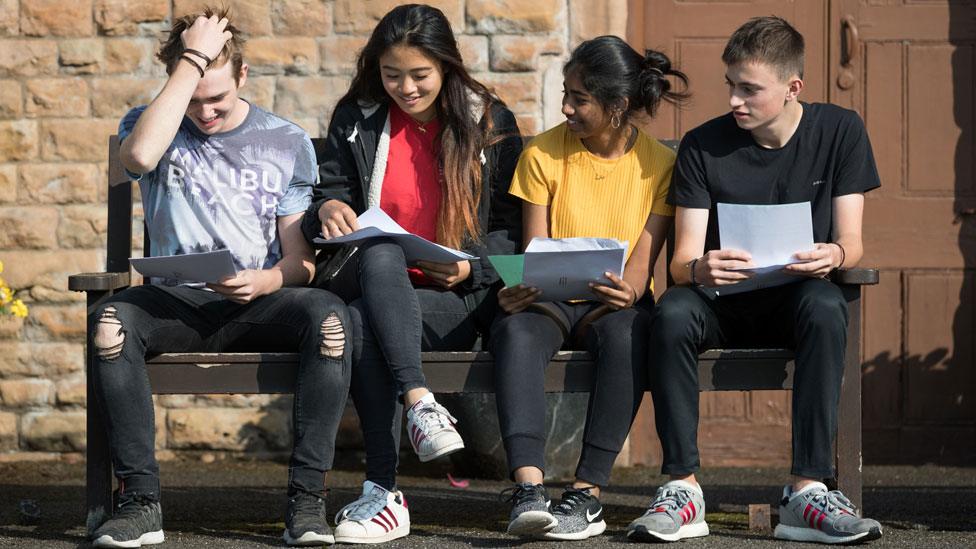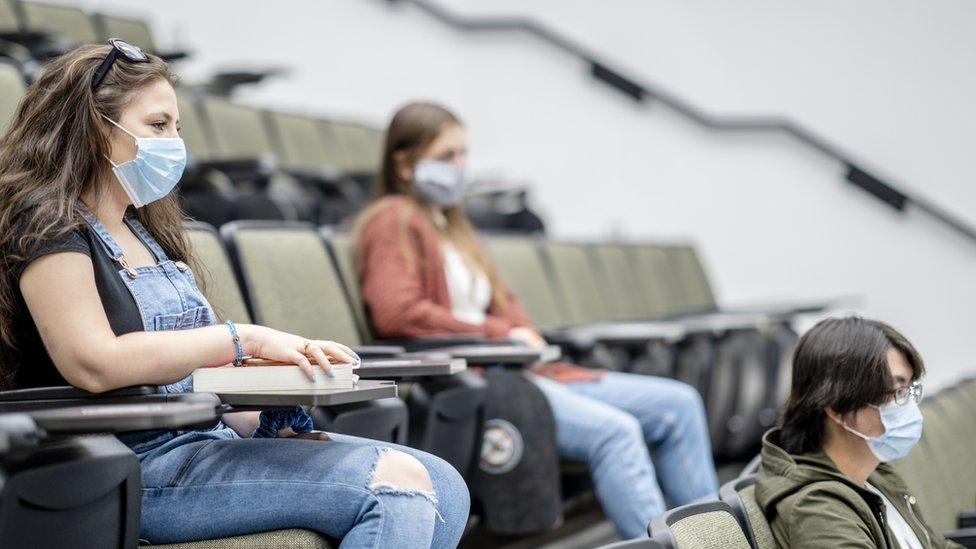NI education: Call for 'parity of esteem' over youth qualifications
- Published

The strategy said that education for over-16s can be too driven by exams rather than skills
There should be "parity of esteem" between academic and more technical or vocational qualifications for young people.
That is one of the key findings in a Stormont strategy aiming to reshape how 14 to 19-year-olds in Northern Ireland are educated.
It also said education for over-16s can be overly driven by exams rather than skills.
Careers guidance and advice should also be overhauled, it said.
The strategy for education and training for 14 to 19-year-olds has been jointly published by the Department of Education (DE) and the Department for the Economy.
It has had input from head teachers, further education (FE) colleges and a range of other experts and organisations.
A record proportion of school leavers in Northern Ireland have entered university during the past two years.
According to statistics from the department, almost 48% of school leavers entered university in both 2020 and 2021 - the highest Northern Ireland rates on record.
But there has also been a significant fall in the number of school leavers entering FE colleges.
The strategy said there was a need for "a more joined-up approach" to post-16 education and training to meet the needs of young people and the economy.
It recommends a number of short, medium and long-term actions to achieve that.

According to statistics from the Department of Education, almost 48% of school leavers entered university in both 2020 and 2021 - the highest Northern Ireland rates on record
The strategy said there was a "need to reform the qualifications system" for 14-19 year olds as "the current qualifications landscape is complex, with too many qualifications which are poorly understood".
While stopping short of calling for specific reform of A-levels, the strategy recommended that young people should be given the opportunity to study a wider range of subjects at school.
But it also warned of an over-dependence on exams for young people.
"There are challenges to ensure sufficient opportunities for skills development at Key Stage 4, where in some cases assessment is driving practice and there can be a focus on a narrow set of skills," it said.
The strategy also highlighted "challenges in terms of parity of esteem" between qualifications that were regarded as more traditional or academic and those that were regarded as vocational and technical.
'Widespread work experience'
As a result, young people are not always made fully aware of the range of options for education and training that may be available to them.
That could change if there was better careers information and guidance, according to the strategy.
It suggested that employers and industry should link more closely with schools and that the Education and Training Inspectorate (ETI) could inspect how effective the careers advice given by schools was.
The strategy also said that there should be more widespread work experience for 14 to 19-year-olds as part of their education.
"Stakeholders considered that work experience should be integrated throughout qualifications as this is essential to building skills, especially for those with additional needs," it said.
But it identified career and training challenges in particular for pupils with special educational needs (SEN), especially after they leave school.
There are a number of other wide-ranging recommendations in the strategy, but it warns that some of the issues to be addressed will take years to move forward.
While not putting a cost on the plans, the authors said it was "crucial that appropriate resources are allocated to ensure that the actions can be taken forward and embedded successfully".
However, there have been a number of recent warnings that many Stormont departments, including education and economy, are likely to face significant spending pressures.
Related topics
- Published27 May 2022

- Published21 January 2022

- Published13 January 2022
